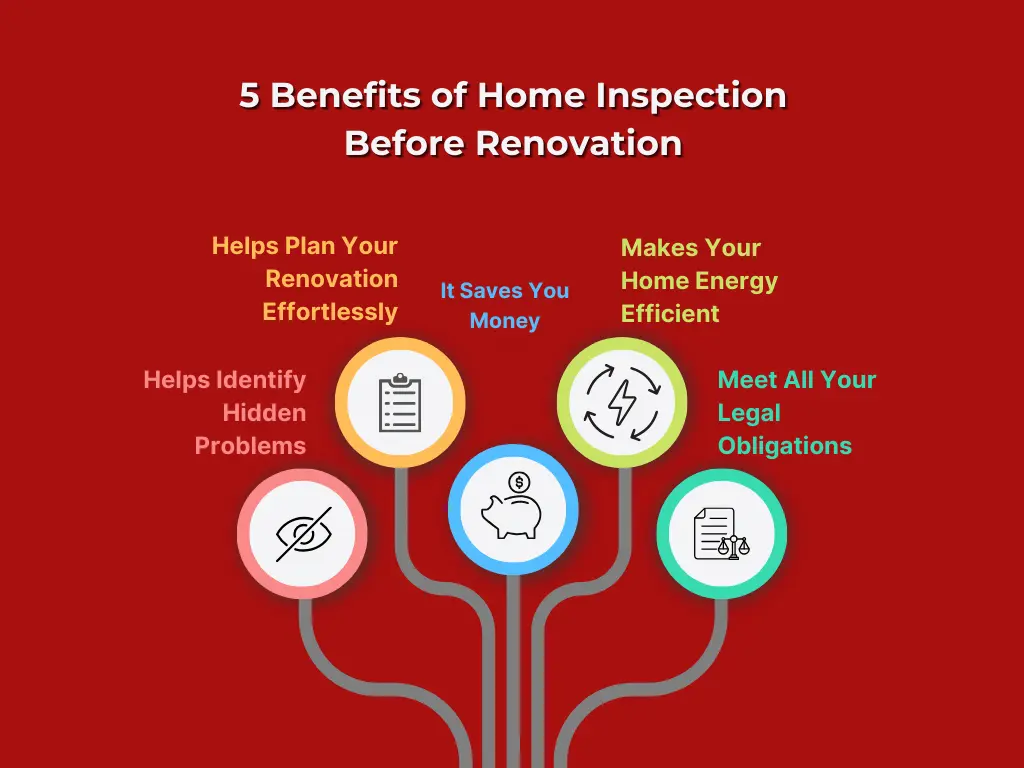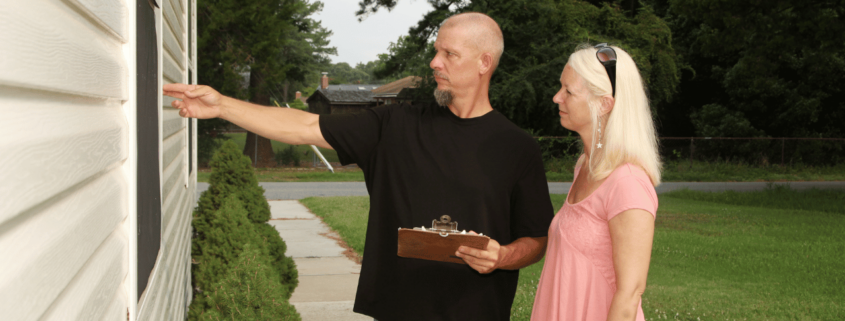Home Renovation Inspection: Why You Should Get One?
Many homeowners choose to renovate their homes for various reasons. Be it to give it a new look, increase property value, address safety concerns, or just simply fulfill their specific needs.
Renovation is always great for your home, but you have to approach it carefully. If not, things can go really wrong really fast and put you in jeopardy.
While it can provide the desired space and aesthetics you want, if not properly planned, it can result in safety hazards, too.
Imagine you are adding a pantry to your kitchen. Without proper planning and safety measures, it can impact the structural integrity of your beloved home and put you and your family at risk.
That is why you should always get a home renovation inspection before you remodel your house.
Although it is a major one, safety is not the only reason you should get a home inspection before renovation.
There are many other reasons and benefits, and that is what we will discuss in this blog.
But first, let me explain what a pre-renovation inspection exactly is.
What is a Home Renovation Inspection?
Like any other kind of inspection, a home renovation inspection is an examination of your home.
Herein, a certified home inspector, like myself, inspects or evaluates your home’s overall condition. We check the structural integrity of your home and other components and systems installed in the home, like your HVAC system.
Also, we look for any issues that need to be addressed, like water leaks or safety hazards (such as mold), before you start your renovation project.
Should I Get a Home Renovation Inspection?
Absolutely yes. You should always get one done.
We all like to think that we know everything about our home. But there are some things only an expert can see.
Let’s say there is a dripping faucet in your bathroom. Nothing major, right?
But it can create the perfect environment for mold to grow, which can become a safety hazard.
The thing is, most homeowners see these small issues as they are, but an expert sees what they can potentially become.
So, even if you think everything is perfect, from my experience, there is always something, small or major, that needs to be fixed.
You might also like to read: New Construction Home Inspection: Why Is It Necessary?
5 Benefits of Home Inspection Before Renovation

1. Helps Identify Hidden Problems
Did you know that old/damaged plumbing and faulty electrical systems are among the major causes of home insurance claims nationwide?
Worse, the latter is even responsible for tens of thousands of electrical fires. In fact, according to the US Fire Administration, there are an average of 28,600 electrical fires every year in the country.
Thankfully, an inspection before a home upgrade provides an excellent opportunity to address these issues once and for all.
By getting a home inspection before renovation, you can identify hidden issues like these and address them in time.
If not, they can affect your renovation plan or become a huge problem down the road.
For instance, one time, I inspected this beautiful home just before the remodeling began. When it was time to check the bathroom, I noticed that there was mold hiding behind the walls.
From the outside, the bathroom was in pristine condition, but on the inside, it was a safety hazard about to happen. But remember, it is pretty common to find mold in such places.
However, If it was left unchecked, it would have become a major, expensive problem. This is something that you don’t want to deal with after you have just spent your money on remodeling.
2. Builds Scope of Work and Helps Plan Your Renovation Effortlessly
The second benefit you get from a home inspection before renovation is that it helps you plan your renovation.
For instance, the inspection provides you with a complete checklist of all the essential areas that need an assessment. Also, you get a detailed report that highlights all the identified problem areas.
Now, you can use this information to address all the issues efficiently and execute your renovation plans accordingly.
So you spend a little bit of money on a pre-renovation inspection, but at the very least, you know what you’re getting.
You’re aware of any defects in the home, you’re aware of any repairs you’re going to have to make. You now know about the money you’re going to have to spend before you renovate the home and make this massive financial commitment.
3. It Saves You Money
Another really good reason to get a home inspection before renovation is that it prevents unnecessary repairs down the road.
Let’s say you spend between $300 and $600, which is the average cost of home inspection in Florida, on your home inspection.
Yes, that seems like a lot.
But the renovation itself is one of the biggest investments you’ll make, and to avoid unnecessary repairs down the road, an inspection is totally worth it.
After all, You identify issues in their early stage and address them before they have the chance to become something big in the future.
For instance, Let’s say you find mold in your home.
Right now, it’s just giving your home an ugly look. But if left untreated, it can eat away at your house and lower its structural integrity.
Not to mention, it is also a health hazard. And if you are allergic, it can become a matter of life and death.
4. Makes Your Home Energy Efficient
A big part of home inspection is to identify any issues with your home’s energy usage.
Now, many people think that if their electrical appliances are in great condition, their home is energy efficient. But that is not the case.
For example, a major portion of your home’s energy is used by your HVAC systems. Now, if there is any kind of issue, big or small, with the insulation of your home, the HVAC system would use that much energy to keep your home warm and cozy in the winter.
That isn’t very energy efficient, is it?
Inspectors check your home for small details like this. They make sure that your home is properly insulated and ventilated, which helps you save big-time on energy bills.
5. Meet All Your Legal Obligations
When you are remodeling your home, you need to make sure that you comply with all building codes and safety regulations.
If you don’t, there are two things that can happen.
First, you might get a visit from local authorities, and if everything isn’t up to code, you may have to pay a hefty fine and in the worst case, revert the changes you made.
For instance, If you put a wall in two and add another room, you might have to get rid of the wall altogether. And you know how tedious that is going to be.
Second, and more importantly, you don’t want your family to live in a house that has had structural changes and isn’t up to code. That’s because doing so will make disasters like the roof falling possible on a rainy or windy day.
Furthermore, Not only is shoddy work a danger to your family, but it is also a danger to the entire neighborhood. It can also put the safety of your neighbors at risk.
For instance, If gas lines are not built to code, dangerous gas leaks can take out several houses.
As a home inspector, I make sure that you comply with every standard and that you can avoid all these problems altogether.
4 Essential Checks In Home Inspection Before Renovation
1. Home’s Structure
In most cases, remodeling is going to change the structure of your house.
For instance, Changing the layout of your home, like by adding or removing an interior wall, is going to affect its structural integrity.
And you don’t want to live in a house with compromised structural integrity. That is a disaster waiting to happen.
In a home inspection before renovation, inspectors check your foundation and load-bearing walls. We tell you the steps you can take to boost your home’s structural integrity and help you plan your renovation in a way that doesn’t compromise your home’s structural integrity.
2. Roof
Roof is another major component of your home. And If you are planning to add something to your roof in a model, like a skylight, you should make sure that your current roof is up to the task.
A home inspector will let you know if it is safe to alter your roof and, if not, recommend the changes required to get the job done.
3. Basement
I have seen many of my clients wanting to change their basement into something more useful other than the storage that it is.
But the thing with basements is that they get damp, and with dampness comes mold.
A home inspector will check you for any signs of mold, and if they find any, they will recommend ways to get rid of it.
And if they don’t find any, they can help you remodel your basement to minimize the risk of mold, water pooling, and water damage down the road.
4. Mechanical Systems
In remodeling, we mostly add new things to our house, and it can possibly cause a strain on the mechanical systems.
For instance, if you add a bathroom, it will affect your plumbing system. Similarly, if you expand your living room, it will affect your HVAC and electrical system if you expand your living room.
So, it is important that you get these systems inspected and check their condition and load-bearing capacity before you begin with your renovation project.
A home inspector will evaluate these systems and recommend changes they need to work flawlessly in the new environment.
Home Renovation Inspection Checklist
1. Structural Integrity
- Check the foundation for cracks or signs of settlement.
- Inspect load-bearing walls for any alterations or compromises.
- Assess the impact of proposed changes on the overall structure.
2. Mechanical Systems
- Evaluate plumbing systems for compatibility with new additions.
- Look for signs of leaking pipes or faulty plumbing.
- Assess the capacity and condition of HVAC systems in relation to expanded living spaces.
- Examine electrical systems for any necessary upgrades or changes.
3. Roof
- Inspect the current roof condition.
- Check if the existing roof can support additions.
- Make sure there are no broken or damaged tiles or shingles.
4. Basement
- Check for signs of dampness and water damage in the basement.
- Make sure there are no signs of moisture.
- Assess the risk of mold.
5. Safety Hazards
- Check for any exposed wiring or unstable structures.
- Make sure smoke detectors and carbon monoxide detectors are properly installed and working.
- Look for signs of pest or termite infestation.
7. Legal Compliance
- Confirm adherence to local building codes and regulations.
- Make sure that the proposed renovations meet legal standards.
Should I Get A Home Inspection During Renovation?
If we go by the book, you definitely should.
Home inspection during renovation helps you make sure everyone is doing their jobs correctly, as they should, and everything is up to code.
But after the renovations are done, city inspectors are going to ask you to get an inspection done anyway to make sure that everything is done correctly.
So, if you think about it, it is kind of a moot point.
That being said, if you get an inspection done during the renovation, the final inspection will go much smoother. Home inspectors will make sure that there is nothing to find in the final inspection.
Plus, it would put your mind at rest, knowing that your home is in safe hands, and you cannot put a price on that.
Should I Get a Home Inspection After Renovation?
Yes, you absolutely should.
You may be wondering exactly why since you already got one done before the remodeling.
Well, the home inspection before renovation helps you understand the current condition of your home before you make any changes to it.
If not, there may be some issues lurking around that you are unaware of, and it will cost you later.
Likewise, a home inspection after renovation helps you understand the current condition of your home after you have made the changes you wanted.
The inspector will confirm the contractor has done everything exactly the way you wanted, everything is up to code, and everything falls under the specifications of your permit.
If that is not good enough, the city inspectors are going to ask you to get a home renovation final inspection anyway.
What If You Don’t Get a Home Inspection After Renovation?
If you do not do the final inspection, a couple of things will happen:
First, your paperwork won’t be closed out, and the tax info on your property won’t be updated.
The value of your home won’t increase for tax purposes. Meaning you can’t loan against the value added by your renovation. You’ll also not be able to have that value reflected on a sale as far as it pertains to a mortgage appraisal.
Secondly, your permit will expire, and you will need to restart the process when you finally do go to settle everything out. The current permit will just show as incomplete.
You can get it done later as well. Typically, permits require a progress inspection every six months, which can be as little as saying, “Hey, here’s where we’re at with it,” and they’ll extend it another six months.
My advice is to get it done as soon as you can.
Sure, it will cost you an extra couple hundred dollars, but believe me, it is worth every single penny.
You might also want to read: 11 Month Home Inspection: Why Is It So Important?
Get a Thorough Home Inspection Plan and an Estimated Project Cost for Free!
In The End
In my professional opinion, a home renovation inspection is something you should get done whenever you are planning to make major renovations in your home. Although it is an extra step, it’s an important one.
Like I said before, you don’t want to find mold hiding behind your bathroom walls after you have renovated it.
Not only would you have to get it removed, but it also means that you would have to work on your bathroom all over again. Not to mention the added cost.
We both know that isn’t going to be cheap and you sure want to avoid it. And that’s just one of many examples. It could be anything.
So, what you want to do is identify and address these issues as soon as you can.
Not only would it save you your dollar bills, but it would also save you from the extra work and stress.
Welcome to HomesteadPI
At HomesteadPI, our team of expert home inspectors is here to help.
Our team of expert home inspectors with decades of experience can help you make sure your renovation project is done just right, and make sure your house is a safe home.
But enough about us, we want to hear about you.
You can call us at (941) 932-0095 or fill out the form here, and we will get you started.





Sweet web site, super design, really clean and employ friendly.
I really enjoyed reading your post about home renovation inspections. It’s clear that a thorough inspection can save homeowners from potential headaches and financial surprises down the road. I appreciate how you emphasized using the latest technology, like thermal imaging and drone services, to offer a deeper, more comprehensive inspection. It seems especially valuable for those considering home renovations, as identifying issues before starting a project can prevent costly repairs later.
I was particularly interested in the way you described the importance of client education throughout the inspection process. It’s reassuring to know that you not only provide a detailed report but also make sure homeowners understand every aspect of their inspection results.
For someone planning a significant home renovation, how can they best use an inspection report to inform their project planning and budgeting?